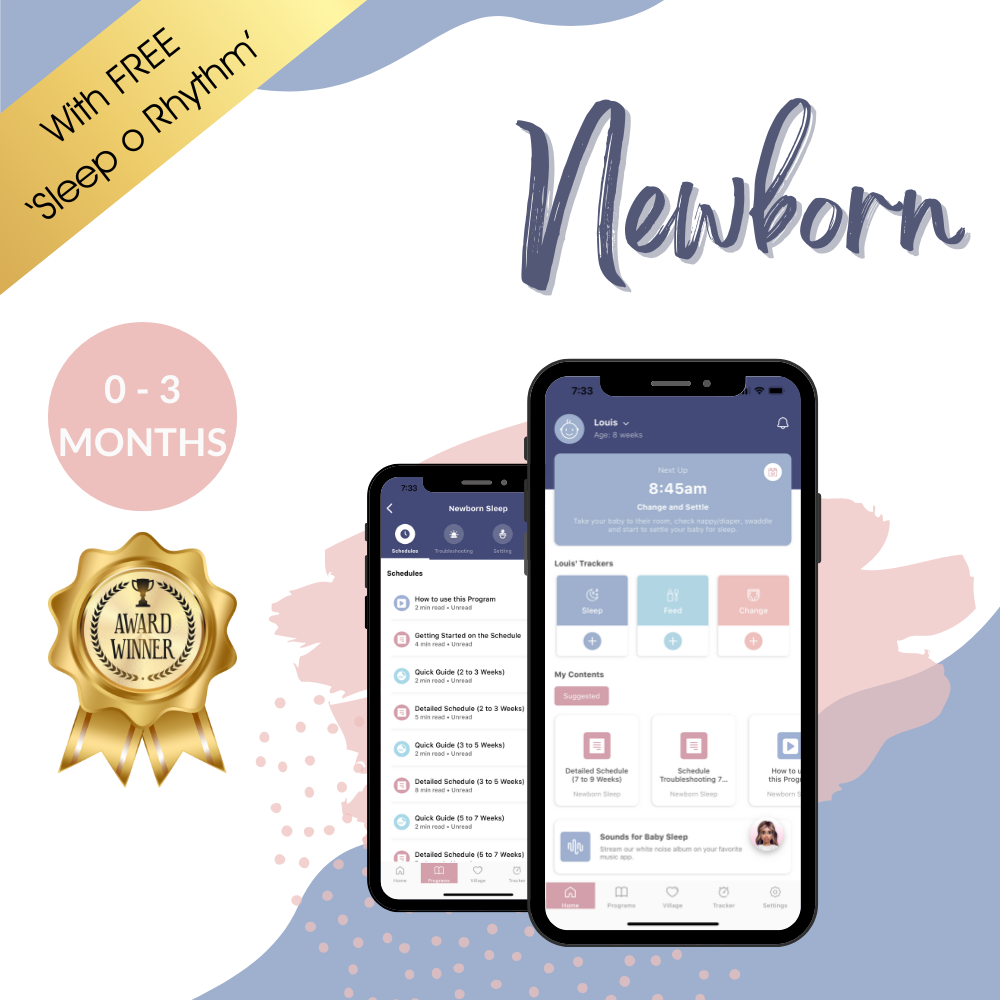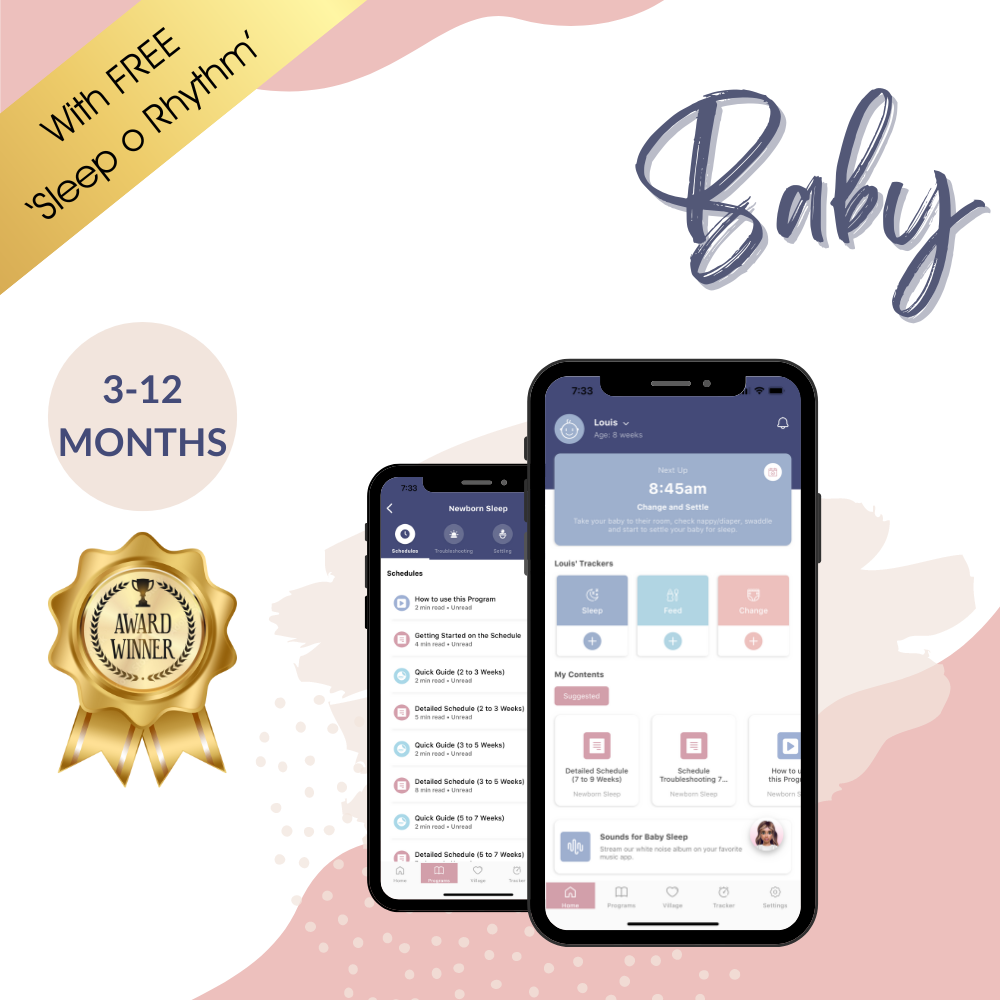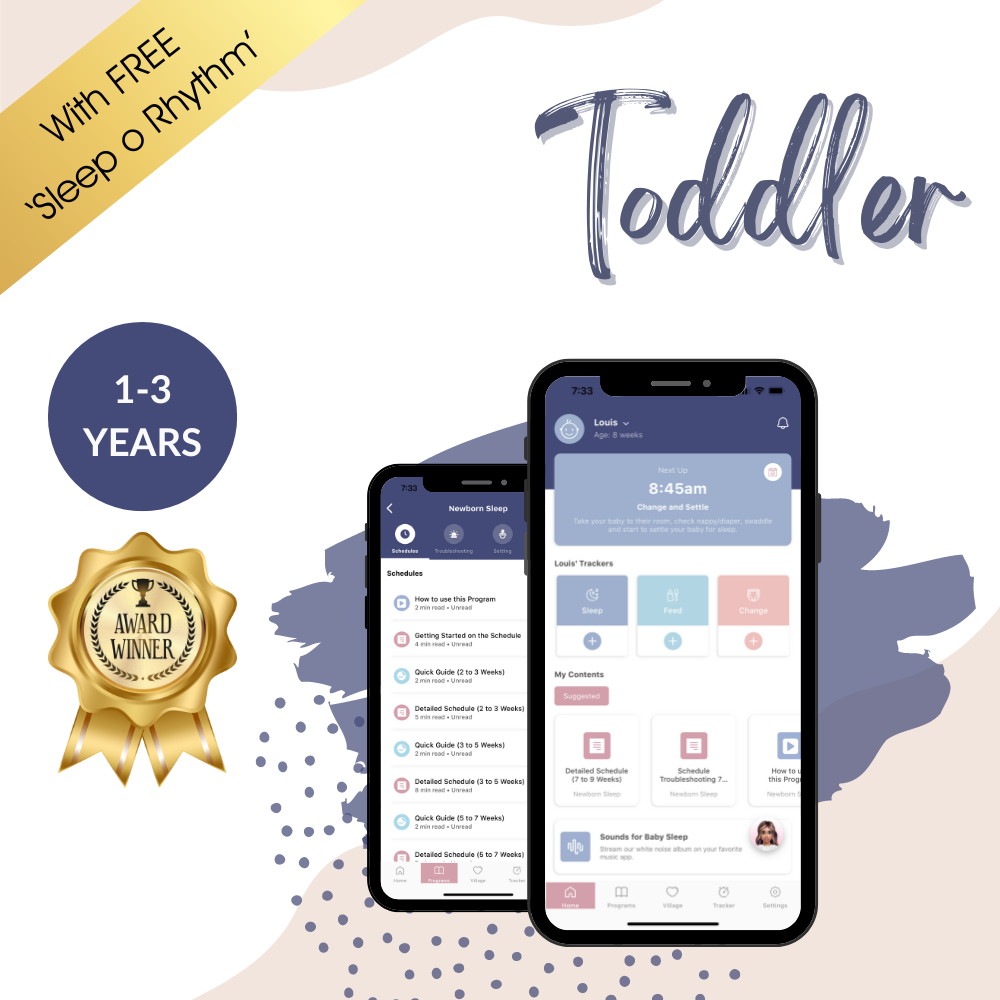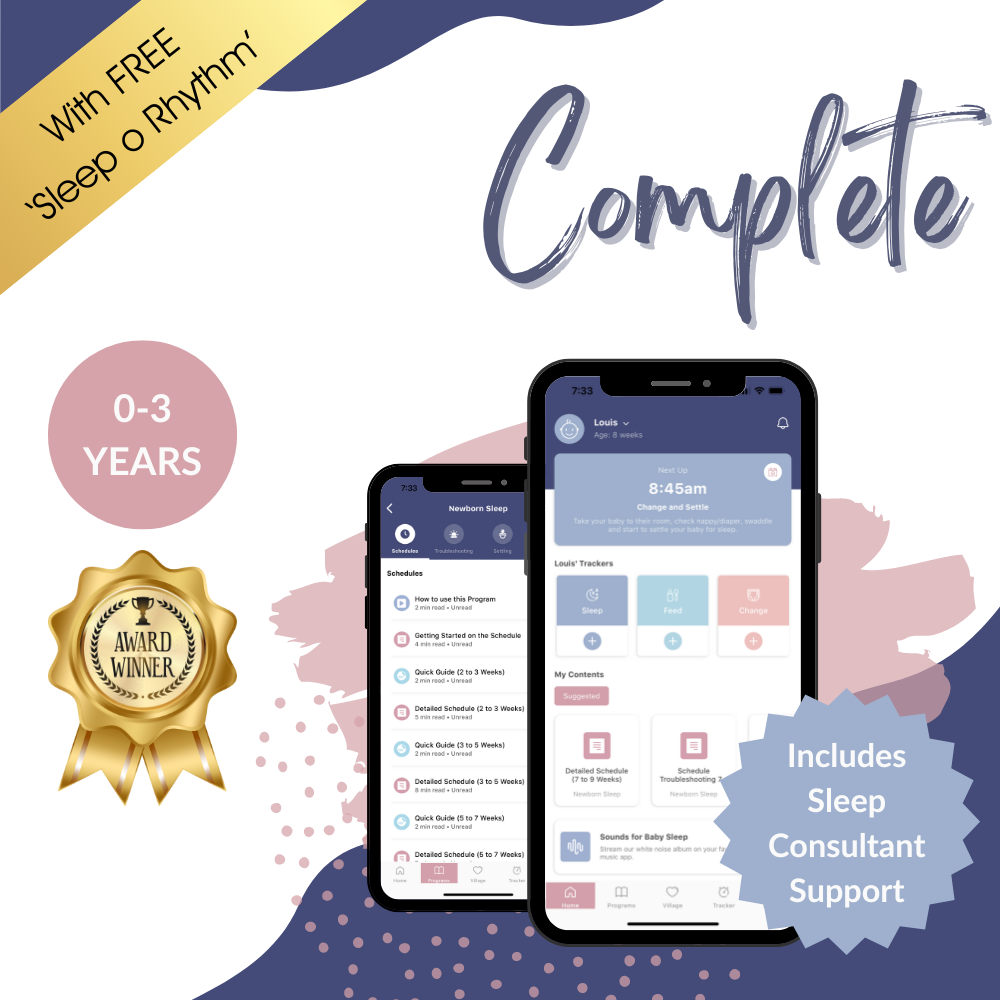
The 8 Week Sleep Regression


By Nicky Barker (BA, Grad. Dip Tch), Pediatric Sleep Science Expert
Before you had your beautiful little baby you may have never heard of the phrase ‘sleep regression’. Now, you find yourself desperately searching the internet in the middle of the night, trying to figure out why your baby’s sleep is suddenly broken!
And the same thing keeps popping up…
“Sleep regression”
Even worse, it’s not just one sleep regression and then it’s over, they are going to keep happening as your baby gets older.
Don’t panic! Your baby is not broken.
Our Little Ones App can help you navigate these tricky baby sleep regressions, but for now let’s find out more about them...
In this article:
- What is a sleep regression?
- What happens at the 8 week sleep regression?
- How long does the 8 week sleep regression last?
- Will my baby's sleep go back to "normal"?
- How can I help my baby through this sleep regression?
Yes, I want more sleep!
If you need a helping hand with tackling your baby’s sleep, then check out our Pediatrician-recommended Sleep Programs.
Get our Sleep Programs
What is a sleep regression?
You keep hearing people talking about it, or seeing it in articles or on social media, but really, what is a sleep regression?
Quite simply it is a period of time when your baby’s sleep or ability to settle to sleep ‘regresses’. Meaning it takes a hit and usually gets worse.
Some babies who were napping like a dream may suddenly start catnapping during the day. Or, if your baby was pretty consistent with their overnight sleep, maybe sleeping all night or having fairly consistent times they’d wake to feed, they may start to wake more frequently or for longer periods of time.
And sleep is not the only thing that can be affected by a sleep regression. Instead of your baby’s naps and overnight sleep becoming problematic, it could be their ability to fall asleep, or self-settle that becomes more challenging.
Whether your baby was a self-settling pro or you had a surefire method for helping them fall asleep, a sleep regression can flip that on its head. Suddenly, your usual tricks aren’t working anymore and you have a cranky, overtired baby on your hands.
This regression in your baby’s sleep or settling can feel incredibly disheartening, like all your hard work has been undone. However, try to remember that a sleep regression is a not a sleep disorder - it is a sign that your baby is developing and maturing.
Often a sleep regression is linked to periods of mental or physical growth and developmental milestones. So although your baby or toddler might regress in their sleep, you will also see them learning and refining new skills, becoming more engaged with you and their environment. These are all positive things!
What happens during the 8 week sleep regression?
By 8 weeks you will hopefully be finding your feet with your newborn. You’ll start to trust your instincts as a parent and get a bit more of a predictable routine to your day. You may feel like the newborn fog is starting to lift and you’ve finally got the hang of things.
Then suddenly, the consistency and predictability that you had just established is gone, seemingly overnight, and you don’t understand why. You start to doubt yourself…. Is this something I caused? Should I be doing something different?
It is easy to second guess what we’re doing. But I’m here to tell you that it’s not something you’ve done wrong that has caused this sudden change in your baby’s sleep patterns.
This is the 8 week, or 2 month sleep regression, and it's exactly what happened in this case study with baby Rose:
Up until around 6 weeks of age, Rose was feeding and sleeping really well. She was doing three long naps during the day and waking naturally from each nap. From 6 weeks on though, mom Sasha started to notice some changes. Click here to read how things unfolded...
Let’s talk about what is happening during this sleep regression.
This sleep regression is often the point where newborns start to catnap (waking after one 30-45 minute cycle of sleep), become a lot more alert and can be trickier to settle to sleep, even if they had been previously settling and sleeping well.
Say goodbye to sleepless nights.
Join over 800,000 families worldwide who are enjoying excellent sleep with our Sleep Programs, created by experts in the field of pediatric sleep.
Get our Sleep Programs
Why? It's all to do with their circadian rhythm waking up, and their melatonin levels.
Melatonin is a sleep hormone that not only helps your baby to fall asleep, but also to stay asleep and regulate their sleep patterns.
Before the 8 week regression, your baby has maternal melatonin in their system, this was passed to them from their mother in utero and has been largely driving their settling and sleep up until now.
As your baby approaches the 8 week mark though, this maternal melatonin begins to wear off and babies need to start producing their own melatonin.
Melatonin is only produced in the dark, so if your baby has been napping in a light, bright room, now is the time to change that. We’ll explore this in more detail in just a moment!
How long does the 8 week regression last?
Unfortunately, this is not something your baby is going to grow out of. This sleep regression is due to a physiological and hormonal change that takes place around 8 weeks old so while you may be mourning the loss of your sleepy newborn, take comfort in the fact that it means your baby is growing and developing as they should.
Some baby sleep regressions are due to neurological and physiological changes such as the 8-10 month sleep regression, where babies are so busy learning new skills that they wake to practise them in the night. These types of regressions often pass by in a few weeks.
This sleep regression is different. Your baby won’t go back to being the sleepy newborn they were at 4 weeks because they are now waking up to the world.
At birth, babies can only see approximately 8 inches away from them. The perfect distance to see whoever is holding them clearly, helping them to bond with their primary caregivers. By 8 weeks old, they have learnt to focus both eyes and are starting to be more aware of colour and movement around them.
The world is becoming an increasingly fascinating place for your newborn and so you can see why it can be harder to settle your baby to sleep now.
Will my baby’s sleep go back to “normal”?
The answer to this question is yes…and no.
As we’ve seen, this regression is due to a physiological change in your baby that won’t be undone in a few weeks time. This is a permanent change. Now, your baby needs to start producing their own melatonin in order to easily settle to sleep and to stay asleep.
If your baby has started to wake after one sleep cycle and is refusing to be resettled back to sleep, it can be incredibly frustrating, as you feel like you never have any time for yourself.
A daytime sleep cycle is approximately 30-45 minutes long so when your baby starts to catnap and wake after one sleep cycle, you start to prioritise what needs to happen in that time.
Should I use their nap to take a shower? Make myself some food? Drink a hot drink (while it’s still hot!) and have a break? Hang the washing out? Clean the kitchen? The list goes on!
Let's get your little one's sleep sorted ASAP!Our award-winning Sleep Programs will solve your baby's sleep challenges in no time.
Get our Sleep Programs
Having been in that situation, I can tell you that 30-45 minutes is NOT enough time to get everything done! It doesn’t give you a break and it doesn’t give your baby the longer, restorative sleep they need for their growth and development.
Now I know this all sounds a bit doom and gloom but the good news is, your baby is not going to catnap forever! As they get older, they will develop the ability to self-settle and resettle themselves in between sleep cycles, so you WILL get some longer naps happening again.
In the meantime, there are a lot of things you can do to encourage longer naps and easier settling and get your baby’s sleep back to “normal”. Let’s take a look at some of these now…
How can I help my baby through the 8 week regression?
Sleep environment
You may have heard that to avoid day and night confusion, you should have your baby nap in a light, bright room during the daytime. The truth is that babies don’t really need to distinguish between day and night, just sleep and awake time.
Awake time is light and bright, there is interaction and playing, feeding and lots of fun things to do and see.
Sleep time is calm, quiet, dark and has a predictable wind-down routine beforehand.
As we mentioned earlier, this regression is all about the change in your baby’s melatonin levels and the key to helping your baby to produce melatonin is a super dark room. A dark room can help your baby sleep for longer periods of time and settle easier. It also helps to prevent them looking around and getting distracted by the world around them.
So now is the time to make sure your baby’s room is completely dark for both naps and overnight sleep. You may want to invest in a blackout blind to make sure no light is creeping in during the day or in the early hours of the morning.
We also recommend the use of white noise for naps and overnight sleep. This rhythmic noise mimics the sounds babies would have heard in the womb, so it is extremely comforting for them. It is also great to block out any background noise that could disturb your baby and cause them to wake.
Swaddling your baby also helps to suppress their startle reflex, which can be another reason why babies this age are hard to settle or wake early from naps.
Naps
The amount of time your baby can stay awake will change rapidly in the first 12 weeks of life. Initially, they’ll probably only be able to stay awake for 1-1.5 hours before needing a nap, but by 12 weeks old their awake time will have stretched out to closer to 2 hours.
If your 8 week old is still napping every 1-1.5 hours, they may be undertired, which will be contributing to their catnapping. They just aren’t tired enough to sleep for any longer, so they wake after one sleep cycle and it often takes a lot of effort on your part to resettle them back to sleep.
Gradually extending your baby’s awake times as they get older helps to build up sleep pressure, so that they will be tired enough to settle for their nap and to stay asleep for the length of their nap.
Feeding
When a baby is first born their stomach is the size of a cherry and can only handle small amounts of milk, so they need to feed quite frequently. By 8 weeks old though, their stomach has grown considerably meaning they are able to take larger feeds that can sustain them for longer periods.
If your 8 week old baby is still taking those smaller, more frequent feeds it may mean that they have fallen into a bit of a snack feeding pattern. These small amounts of milk will only sustain them for short periods of time so this can mean they wake hungry during naps, needing to be fed again.
Now, we’re not saying you need to change this. If you want to feed on demand, that’s great, do what works for you and your baby. Just be aware that they may begin to wake hungry during their naps now. If that happens, try to feed them back to sleep so that they can finish their nap.
If you want to try to avoid your baby waking hungry during naps though, the key is to encourage them to take full feeds at regular times throughout the day. You can also offer a small top up feed before their lunch nap to help keep them fuller for longer there.
Consistency
When your baby isn’t sleeping well it can be tempting to try every trick up your sleeve; co-sleeping, feeding to sleep, rocking them, contact napping or buying every gadget that promises to help them sleep!
The truth is, having a consistent routine and approach to settling is going to be much more beneficial to you both in the long run.
So if you don’t usually bounce your baby to sleep on a yoga ball for their naps or drive them round in the middle of the night to get them back to sleep, now is not the time to start!
Our Little Ones App can help take the guesswork out of when your baby should be feeding and napping during the day, so you can focus on enjoying your little one. We also provide several gentle settling methods to choose from, if you need a hand settling your baby to sleep.
Conclusion
The 8 week baby sleep regression is a physiological change linked to the sleep hormone melatonin. Your baby is becoming more alert and aware of the world around them and now needs to start producing their own melatonin in order to settle and sleep well.
Putting your baby to sleep in a dark room, with a swaddle and white noise, will give them the best chance at settling easily and sleeping for longer.
If you find that your baby still isn’t sleeping well though, have a look at other factors that could be contributing to this such as the amount of awake time between naps and their feeding pattern during the day.
Being armed with the knowledge of WHY your baby is experiencing a sleep regression will hopefully help you to feel more confident in managing this change, supporting your baby and getting their sleep back on track.
So you can go back to finding your feet, discovering who you are as a parent and hopefully still enjoy a hot drink along the way!
Bibliography
Gellar, D. (2022). How does my baby see the world? How far can she see?. Retrieved 12 April 2022 from https://www.babycenter.com/baby/baby-development/how-does-my-baby-see-the-world-how-far-can-she-see_6564
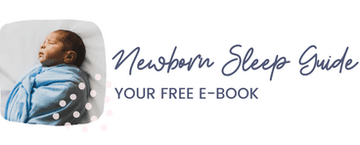
Receive product and services updates, promotional offers and other marketing communications based.


